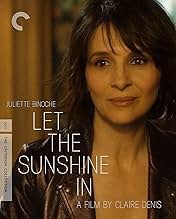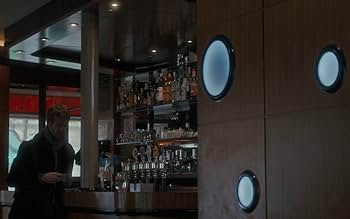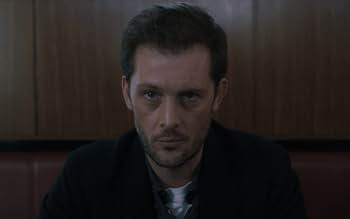IMDb RATING
6.0/10
8.2K
YOUR RATING
Isabelle, Parisian artist, divorced mother, is looking for love, true love at last.Isabelle, Parisian artist, divorced mother, is looking for love, true love at last.Isabelle, Parisian artist, divorced mother, is looking for love, true love at last.
- Director
- Writers
- Stars
- Awards
- 2 wins & 13 nominations total
- Director
- Writers
- All cast & crew
- Production, box office & more at IMDbPro
Featured reviews
I hadn't seen a preview or even read a precis before going, but I generally like French movies, so I went. I didn't know what to make of it -- at the beginning I thought it was a drama, but then the scenes got absurdly exaggerated, and I decided it must be a comedy that the language barrier kept me from finding funny. So I was surprised to learn from the reviews here that it was not a comedy! I still don't know what to make of it. So, my advice is, if you have to pay money to see this and you don't speak fluent French, don't bother (in my case, I have a theater membership that allows me pretty much unlimited movies, so I do tend to take chances).
... in its focus on unsatisfactory relationships - and it even has Depardieu in a pointless cameo role!
At one level, it's not too surprising that a well-regarded female artist of a certain age would have trouble finding a suitable partner following her divorce. However, her inability does seem at least somewhat self-inflicted, as she keeps latching on to married and otherwise unavailable men - some of whom are clearly complete arseholes. Indeed, there were so many of these I lost track of who was supposed to be "just a friend" and who was her current lover, and what might happen in her future.
Worth a look, but not Binoche's best, IMHO.
At one level, it's not too surprising that a well-regarded female artist of a certain age would have trouble finding a suitable partner following her divorce. However, her inability does seem at least somewhat self-inflicted, as she keeps latching on to married and otherwise unavailable men - some of whom are clearly complete arseholes. Indeed, there were so many of these I lost track of who was supposed to be "just a friend" and who was her current lover, and what might happen in her future.
Worth a look, but not Binoche's best, IMHO.
"Let the Sunshine In" (2017 release from France; 94 min.; original title "Un beau soleil intérieur") brings the story of Isabelle. As the movie opens, we see Isabelle, naked, and making love to a guy we later learn is married (but not to Isabelle). Isabelle is enjoying a week of relative freedom as her 10 yr. old daughter is away at her dad's, Isabelle's former husband Francois. Soon we learn that Isabelle is deeply unhappy and restless about where she is in her life, and her love life in particular. At this point we're 10 min. into the movie but to tell you more of the plot would spoil your viewing experience, you'll just have to see for yourself how it all plays out.
Couple of comments: this is the latest movie from French writer-director Claire Denis. Here she gets to work with one of France's treasures, actress Juliette Binoche. Binoche carries this movie on her shoulders from start to finish, and along the way exposes herself in ways I can't recall before. And it has to be said: Binoche is not in her mid-50s but she looks at least 10 years younger. The movie is what one could generalize as being a "typical French talkie", in which there is a lot, a LOT, of conversation and not much else. The director had the great sense of letting scenes play out, for minutes on, without interruption, as if we are simply a fly on the wall listening in on strangers talking. And yet, for all that closeness, I couldn't find myself all that emotionally invested in the movie or these characters. Yes, one feels that Binoche is delivering a towering performance but so what? Last but not least, Gerard Depardieu makes an appearance at the very end of the movie, as a fortune teller of some sort.
""Let the Sunshine In" premiered at last year's Cannes film festival, to positive acclaim (mostly for Juliette Binoche's performance). Almost exactly a year later, this movie finally showed up at my local art-house theater here in Cincinnati. The Saturday matinee performance where I saw this at was not attended well (4 people, including myself), I honestly can't see this playing in the theater very long. If you are interested in "French talkies" or a character study of a woman struggling with various relationships (think "An Unmarried Woman" or "Starting Over"), I'd suggest you check this out, be it in the theater, on VOD, or eventually on DVD/Blu-ray, and draw your own conclusion.
Couple of comments: this is the latest movie from French writer-director Claire Denis. Here she gets to work with one of France's treasures, actress Juliette Binoche. Binoche carries this movie on her shoulders from start to finish, and along the way exposes herself in ways I can't recall before. And it has to be said: Binoche is not in her mid-50s but she looks at least 10 years younger. The movie is what one could generalize as being a "typical French talkie", in which there is a lot, a LOT, of conversation and not much else. The director had the great sense of letting scenes play out, for minutes on, without interruption, as if we are simply a fly on the wall listening in on strangers talking. And yet, for all that closeness, I couldn't find myself all that emotionally invested in the movie or these characters. Yes, one feels that Binoche is delivering a towering performance but so what? Last but not least, Gerard Depardieu makes an appearance at the very end of the movie, as a fortune teller of some sort.
""Let the Sunshine In" premiered at last year's Cannes film festival, to positive acclaim (mostly for Juliette Binoche's performance). Almost exactly a year later, this movie finally showed up at my local art-house theater here in Cincinnati. The Saturday matinee performance where I saw this at was not attended well (4 people, including myself), I honestly can't see this playing in the theater very long. If you are interested in "French talkies" or a character study of a woman struggling with various relationships (think "An Unmarried Woman" or "Starting Over"), I'd suggest you check this out, be it in the theater, on VOD, or eventually on DVD/Blu-ray, and draw your own conclusion.
"You don't have to go looking for love when it's where you come from" - Werner Erhard
Isabelle (Juliet Binoche, "Ghost in the Shell"), a divorced fiftyish artist, is attractive, urbane, and highly intelligent but her relationships seem to have a built-in mechanism for self destruction. The men in Isabelle's life offer her little except temporary physical pleasure and are pretty much ciphers (and not very nice ones at that). Loosely based on Roland Barthes' book "A Lover's Discourse: Fragments" with a screenplay by Christine Angot, Claire Denis' sophisticated comedy/drama Let the Sunshine In (Un beau soleil intérieur) is lighter fare than normal for Denis, but it has its probing, self-reflective moments and Juliet Binoche, as usual, is an appealing screen presence.
Like many of us, Isabelle wants to find someone who fits her pictures but, as most of us discover sooner or later, life often does not fit our pictures. All of Isabelle's relationships start out to be very promising but eventually the decisions she makes about her partners seem to get in the way of her satisfaction. Whatever she thinks that she is looking for, she does not find it with either banker Vincent (Xavier Beauvois, "Django"), actor (Nicolas Duvauchelle, "Wedding Unplanned"), ex-husband Francois (Laurent Gréville, "A Perfect Man"), or any other potential beau for that matter. The film begins with Isabelle in bed with the married, pretentious Vincent. Things are looking a-ok until she decides that he is taking too long to climax, a fact she decides reflects badly on her.
Vincent asks her whether she has had more success with other lovers, but her response is a convincing slap in the face. She is with him when he bullies a bartender but she does not react. The next time he visits her in her apartment, however, she calls him an unrepeatable name, then tells him to leave and not come back. Instead, she hooks up with a young actor (Duvauchelle), also married, though with a better disposition. When she invites him in for a drink, they play endless games about whether he should stay or leave. When he decides to stay, they go through the motions together but by the next morning he concludes that things were better before they had sex and wishes that it had not happened.
The next one up is François (Gréville), Isabelle's ex-husband, who is concerned about their ten-year-old daughter after she tells him that her mother cries every night. This is not good news for her to hear and she uses it as a reason to end any chance for reconciliation. There are several more suitors that follow but Isabelle always finds something about them that she dislikes. She meets Sylvain (Paul Blain, "All is Forgiven") at a club who literally carries her away with pleasure as they dance to Etta James' beautiful "At Last." Unfortunately, Fabrice (Bruno Podalydès, "Chocolat"), an art gallery owner, convinces her that Sylvain is wrong for her because he is not a good fit for her circle. This provides cover for her to end yet another relationship, one that had barely even begun. There is not much left for her of course but to go to a clairvoyant (Gerard Depardieu, "You Only Live Once"), but his banter provides little certainty that she will find "the one." There are times in Let the Sunshine In when Isabelle has moments of happiness and optimism, but she can also come across as needy and, at times, almost desperate. Through the magic of Binoche's performance, Isabelle is a sympathetic figure and one that we root for. Her quest, however, has a touch of game playing to it and it seems that, for Isabelle, it may not be whether you win or lose but how you play the game.
Isabelle (Juliet Binoche, "Ghost in the Shell"), a divorced fiftyish artist, is attractive, urbane, and highly intelligent but her relationships seem to have a built-in mechanism for self destruction. The men in Isabelle's life offer her little except temporary physical pleasure and are pretty much ciphers (and not very nice ones at that). Loosely based on Roland Barthes' book "A Lover's Discourse: Fragments" with a screenplay by Christine Angot, Claire Denis' sophisticated comedy/drama Let the Sunshine In (Un beau soleil intérieur) is lighter fare than normal for Denis, but it has its probing, self-reflective moments and Juliet Binoche, as usual, is an appealing screen presence.
Like many of us, Isabelle wants to find someone who fits her pictures but, as most of us discover sooner or later, life often does not fit our pictures. All of Isabelle's relationships start out to be very promising but eventually the decisions she makes about her partners seem to get in the way of her satisfaction. Whatever she thinks that she is looking for, she does not find it with either banker Vincent (Xavier Beauvois, "Django"), actor (Nicolas Duvauchelle, "Wedding Unplanned"), ex-husband Francois (Laurent Gréville, "A Perfect Man"), or any other potential beau for that matter. The film begins with Isabelle in bed with the married, pretentious Vincent. Things are looking a-ok until she decides that he is taking too long to climax, a fact she decides reflects badly on her.
Vincent asks her whether she has had more success with other lovers, but her response is a convincing slap in the face. She is with him when he bullies a bartender but she does not react. The next time he visits her in her apartment, however, she calls him an unrepeatable name, then tells him to leave and not come back. Instead, she hooks up with a young actor (Duvauchelle), also married, though with a better disposition. When she invites him in for a drink, they play endless games about whether he should stay or leave. When he decides to stay, they go through the motions together but by the next morning he concludes that things were better before they had sex and wishes that it had not happened.
The next one up is François (Gréville), Isabelle's ex-husband, who is concerned about their ten-year-old daughter after she tells him that her mother cries every night. This is not good news for her to hear and she uses it as a reason to end any chance for reconciliation. There are several more suitors that follow but Isabelle always finds something about them that she dislikes. She meets Sylvain (Paul Blain, "All is Forgiven") at a club who literally carries her away with pleasure as they dance to Etta James' beautiful "At Last." Unfortunately, Fabrice (Bruno Podalydès, "Chocolat"), an art gallery owner, convinces her that Sylvain is wrong for her because he is not a good fit for her circle. This provides cover for her to end yet another relationship, one that had barely even begun. There is not much left for her of course but to go to a clairvoyant (Gerard Depardieu, "You Only Live Once"), but his banter provides little certainty that she will find "the one." There are times in Let the Sunshine In when Isabelle has moments of happiness and optimism, but she can also come across as needy and, at times, almost desperate. Through the magic of Binoche's performance, Isabelle is a sympathetic figure and one that we root for. Her quest, however, has a touch of game playing to it and it seems that, for Isabelle, it may not be whether you win or lose but how you play the game.
Audiences went into this French drama as if they were partaking in a romcom buffet at their local boulangerie, but unsurprisingly came out disappointed when they weren't given the usual Katherine Heigl American trash that pollutes the genre. This is not a traditional romantic comedy. I repeat, not a traditional romcom. It is a drama about love, layering themes of romance and philosophies on life through an almost schizophrenic perspective. And with that, Denis has produced a wonderfully intimate portrayal of modern love through her ornate methods of artistic direction. A woman, struggling to find love, becomes involved with multiple men in an attempt to find stability and a relationship.
On the surface, this resembles a vapid pretentious outlook on the morality of men and emotional instability of women. However if you inspect Denis' contemporary storytelling techniques, it's actually a personable venture of self-discovery. A woman acquiring the fragility and tenderness that love shares with its victims, both a curse and a blessing. Coming to terms with how delicate a relationship can be, with a persistence on why certain aspects "should not be rushed".
The various men she encounters all treat her differently. A rich banker uses her to cheat on his wife, an actor regrets sleeping with her on the first meet and her ex-boyfriend/husband is unable to rekindle their flame. The only man who she believes treats her appropriately is seemingly the complete opposite to her personality, with her colleagues subconsciously planting doubt in her mind.
Denis consistently hones in on her neurotic behaviour which, whilst provides a very subtle amount of humour, allows her to experience the pain of love. It does inadvertently force her character to be disconnected with the audience, and on occasion results in her having a low morality compass. Yet fortunately the drama is shrouded in humanity. Everything felt natural. What helped elevate this was Denis' direction. A ludicrous amount of one take scenes allow us to become involved in their lives. The most notable of these being an eight minute unedited scene to which she talks to a banker at a bar. It also showcases Binoche's fantastic performance as she switches between emotions almost instantly. One second she is happily in love, the next filling her mind with doubt.
The scenes of sexual nature however felt rather excessive, particularly the introductory scene, that detracted from Denis' classy artistry. It may have highlighted the sleazy behaviour of these characters, but contrasts with the delicate portrayal of love. A nice touch that I found noteworthy was the concluding conversation with Depardieu. Midway through, the credits start rolling to emphasise the distractions that romances can cause, and it's these sort of contemporary details that enhance the film's interpretation.
Denis is certainly crafting films that aren't particularly accessible to the typical audience, but that does not result in her films being just exercises in vapidity. There's an intricate amount of humanity that brings life to this unconventional "romcom" that really should not be blocking that elusive sunshine.
On the surface, this resembles a vapid pretentious outlook on the morality of men and emotional instability of women. However if you inspect Denis' contemporary storytelling techniques, it's actually a personable venture of self-discovery. A woman acquiring the fragility and tenderness that love shares with its victims, both a curse and a blessing. Coming to terms with how delicate a relationship can be, with a persistence on why certain aspects "should not be rushed".
The various men she encounters all treat her differently. A rich banker uses her to cheat on his wife, an actor regrets sleeping with her on the first meet and her ex-boyfriend/husband is unable to rekindle their flame. The only man who she believes treats her appropriately is seemingly the complete opposite to her personality, with her colleagues subconsciously planting doubt in her mind.
Denis consistently hones in on her neurotic behaviour which, whilst provides a very subtle amount of humour, allows her to experience the pain of love. It does inadvertently force her character to be disconnected with the audience, and on occasion results in her having a low morality compass. Yet fortunately the drama is shrouded in humanity. Everything felt natural. What helped elevate this was Denis' direction. A ludicrous amount of one take scenes allow us to become involved in their lives. The most notable of these being an eight minute unedited scene to which she talks to a banker at a bar. It also showcases Binoche's fantastic performance as she switches between emotions almost instantly. One second she is happily in love, the next filling her mind with doubt.
The scenes of sexual nature however felt rather excessive, particularly the introductory scene, that detracted from Denis' classy artistry. It may have highlighted the sleazy behaviour of these characters, but contrasts with the delicate portrayal of love. A nice touch that I found noteworthy was the concluding conversation with Depardieu. Midway through, the credits start rolling to emphasise the distractions that romances can cause, and it's these sort of contemporary details that enhance the film's interpretation.
Denis is certainly crafting films that aren't particularly accessible to the typical audience, but that does not result in her films being just exercises in vapidity. There's an intricate amount of humanity that brings life to this unconventional "romcom" that really should not be blocking that elusive sunshine.
Did you know
- TriviaThis film is part of the Criterion Collection, spine #976.
- Crazy creditsClosing credits are seen over a therapy session with David and Isabelle.
- How long is Let the Sunshine In?Powered by Alexa
Details
- Release date
- Countries of origin
- Official sites
- Language
- Also known as
- Dark Glasses
- Filming locations
- Paris, France(Main Location)
- Production companies
- See more company credits at IMDbPro
Box office
- Budget
- €2,978,000 (estimated)
- Gross US & Canada
- $892,421
- Opening weekend US & Canada
- $39,699
- Apr 29, 2018
- Gross worldwide
- $4,192,590
- Runtime
- 1h 34m(94 min)
- Color
- Aspect ratio
- 1.66 : 1
Contribute to this page
Suggest an edit or add missing content



































